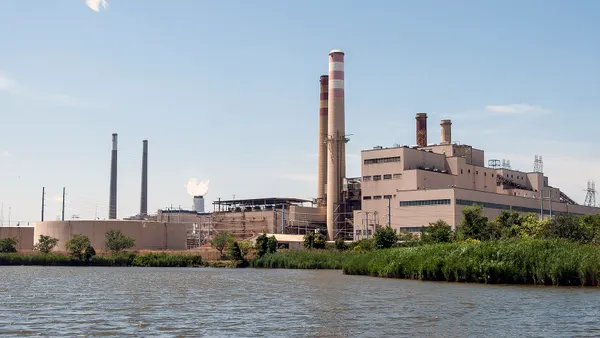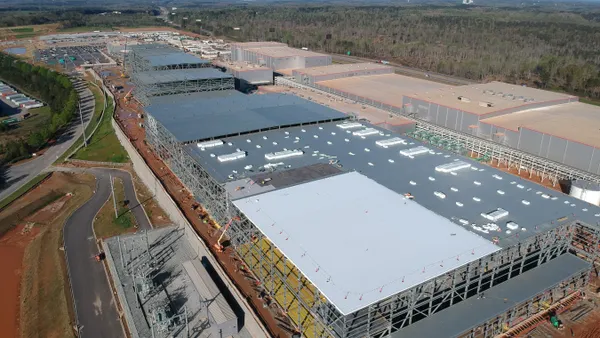Dive Brief:
-
Federal Energy Regulatory Commission ethics officials have advised Commissioner Bernard McNamee to not recuse himself from FERC's grid resilience proceeding, the regulator said in a Monday letter to Senate Democrats, unless it comes to "closely resemble" the debate over the coal and nuclear bailout proposal he helped craft at the Department of Energy.
-
FERC set up the resilience docket last January after rejecting the plan McNamee helped design. Democrats and environmental groups pressed him to recuse himself from the resilience proceeding, but the letter says McNamee told ethics officials he would only step aside if the original bailout plan comes before FERC again.
-
Democrats also pushed McNamee to recuse himself from issues "pitting one fuel source against another" after the release of a February video critical of renewable energy. Ethics officials wrote they would take those issues on a "case-by-case basis," but final decisions about any recusal rest with the commissioner himself.
Dive Insight:
McNamee's letter to Senate Democrats attempts to draw a distinction between FERC's rejection of the DOE's Notice of Proposed Rulemaking (NOPR) to prop up coal and nuclear plants and the longer-term resilience docket regulators set up in its wake.
The letter includes a correspondence between McNamee and FERC Associate General Counsel Charles A. Beamon about an ethics briefing on Dec. 12. It was supplied to Utility Dive by a source close to the issue who requested anonymity because they were not authorized to release it publicly.
In the note, Beamon wrote that McNamee informed him during the meeting that he would recuse himself from votes on the DOE bailout plan if it comes up for rehearing at the agency.
The ethics official wrote that he told McNamee that although the bailout docket (RM18-1) and resilience proceeding (AD18-7) are similar, “I advised you that I do not view the relationship as requiring your recusal."
"I emphasized that Docket No. AD18-7 is a different proceeding than Docket No. RM18-1," Beamon wrote. "I also noted that Docket No. AD 18-7 is an administrative inquiry in which the Commission received over 200 comments suggesting various outcomes. Moreover, based on the facts known to me, I do not view your prior position and statements as demonstrative of an unalterably closed mind as to that administrative docket."
That ethics recommendation could change, however, if the debate in the resilience docket takes the shape of arguments already hashed out in the bailout debate.
"I cautioned you that we must exercise continued oversight to ensure that Docket No. AD18-7 does not develop in such a way as to replicate or closely resemble Docket No. RM18-1, which given your prior participation would require your recusal," Beamon wrote.
Just what would meet that standard remains unclear, say some energy lawyers, particularly because the resilience docket already contains comments from some coal and nuclear owners that resemble their arguments over the bailout plan. FERC declined to comment when reached by Utility Dive.
"The 'unalterably closed mind' standard for recusal in rulemakings is exceedingly difficult to satisfy," Joel Eisen, Professor at the University of Richmond School of Law, said via email. "On the other hand, I agree with those who have commented that the resilience docket could develop in numerous ways that would 'replicate or closely resemble' the NOPR docket and therefore according to this memo would require Commissioner McNamee's recusal."
Some of the options proposed in the resilience docket "might include changes to plant compensation, which would be little different from the situation contemplated by the [bailout,]" Eisen added. "It would be prudent for him to recuse himself before such a situation arose, but he apparently has no intention of doing so."
Though McNamee pledged during his confirmation hearing to consult with ethics officials, any recusal decision remains his alone. Ari Peskoe, the director of the Harvard Electricity Law Initiative, said he must remain vigilant about monitoring the grid resilience docket.
"Commissioner McNamee's decision to recuse himself from the NOPR docket is consistent with the law and a welcome development," said Peskoe, who previously pressed McNamee to recuse himself from both proceedings. "Although it appears that he is not recusing himself from the grid resilience proceeding, I appreciate FERC's ethics officer's commitment to continued oversight should the proceeding become a vehicle for reviving the NOPR."
Senate Democrats on Tuesday struck a similar tone, pushing FERC ethics officials to watch the evolving resilience debate closely.
Commissioner McNamee has sought ethics guidance & recused himself from proceeds pertaining to the Admin's coal and nuclear bailout. I urge the FERC to continue exercising oversight on matters that may warrant recusal in order to hold our leaders accountable & ensure impartiality. https://t.co/ywTDiXiaV8
— Senator Cortez Masto (@SenCortezMasto) January 8, 2019
McNamee's letter also addresses comments he made in a February 2018 speech released by Utility Dive in which he questions the reliability of renewable energy and criticizes multiple environmental groups.
Democrats had said the comments “at a minimum suggest a strong bias against renewable energy technologies,” but Beamon said stakeholders would be able to raise concerns about the remarks during individual proceedings, rather than requiring a blanket recusal.
“As I explained to you during your ethics briefing, parties have previously made challenges to a Commissioner's participation in a specific proceeding,” Beamon wrote. “In each instance, the challenge received proper consideration during the course of the proceeding. Accordingly, I advised you that such issues are considered in each proceeding on a case-by-case basis.”












